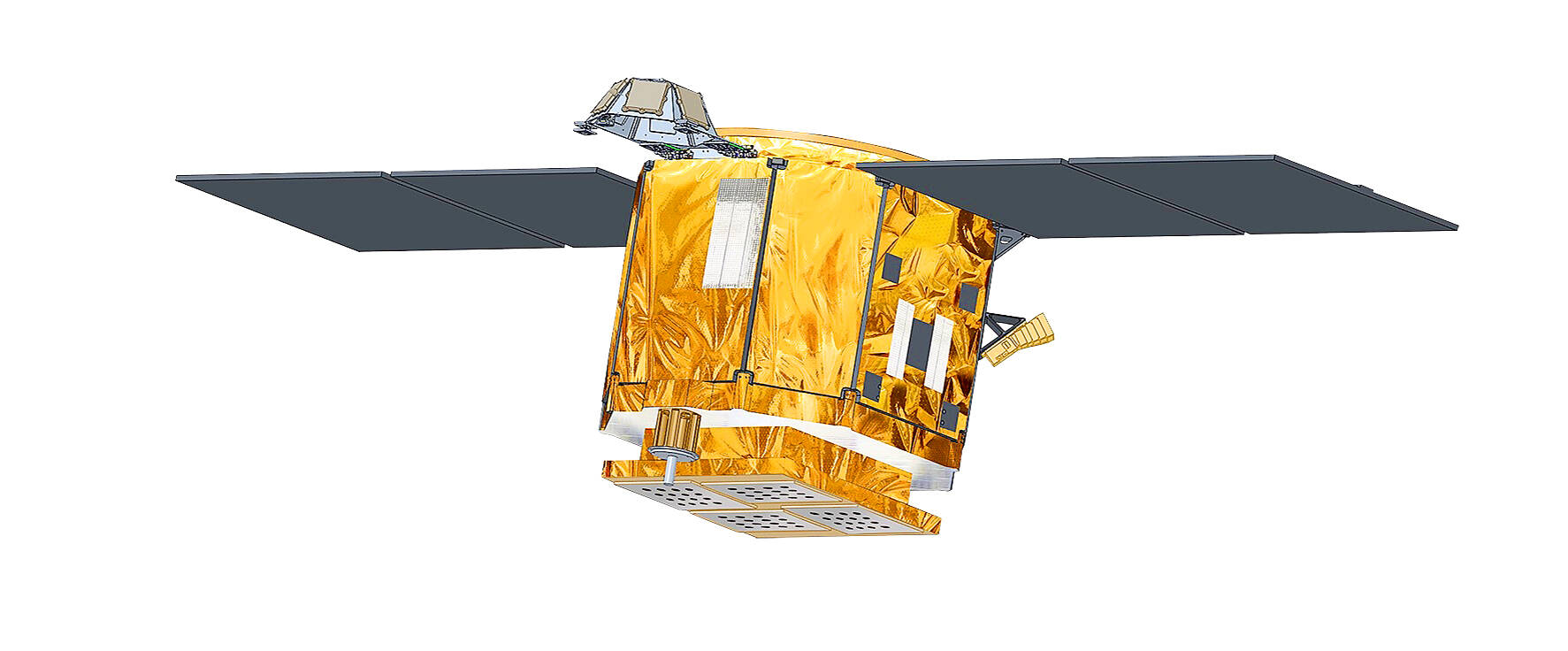The Ministry of Digital Affairs is to build hundreds of satellite terminals to bolster the nation’s digital infrastructure against a potential Chinese attack, an official familiar with the matter said yesterday.
The Executive Yuan has authorized the ministry to proceed with the satellite terminal program, the funding for which is to come from the phase 4 budget of the “Far Vision Infrastructure Plan,” the official said, speaking on condition of anonymity.
Chunghwa Telecom Co (中華電信) last month reported that Internet services in Lienchiang County (Matsu) were significantly disrupted after undersea cables were severed by a Chinese trawler and another unknown vessel in separate incidents.

Photo provided by the Taiwan Space Agency
The war in Ukraine has underscored the importance of the Internet in modern combat and campaigns to garner international support, which makes the resilience of Taiwan’s cyberinfrastructure a concern for national security, the official said.
More than 700 terminals — including three outside the country — are to be installed by next year to supplement the cables, which could be targeted by the Chinese military, the official said.
The ministry is soon to announce a contract for the project, which would be awarded through open bidding, they said.
The utilization of certified non-geosynchronous orbit satellites, including low Earth orbit satellites, would be a requirement for the contract, they added.
The terminals would act as a backup system to allow the continuity of Internet communications should hostile actions cripple Taiwan’s information infrastructure, the official said.
The national security establishment is to play an advisory role in site selection, and the exact locations of the terminals are to be kept secret, they said.
The terminals are to provide the president with a secure means of communication with the premier, the Cabinet and local governments, as well as Washington and Tokyo, they said.
The system should enable the president to address the nation directly, including residents in remote regions and outlying islands, the official said, adding that some schools, hospitals, fire services, police agencies and emergency shelters would also be supported.
The government could install terminals in every township, they said.
At least 6,882 locations potentially need satellite links, but not all sites would receive terminals due to cost constraints, they said, adding that mobile terminals were being considered as a stopgap.
The Ministry of Digital Affairs is evaluating the security of two domestic companies seeking commercial permits to use satellite frequency bands, which would qualify them as service providers to the government, the official said.
Foreign companies might be allowed to bid if no local firms pass evaluations, they said.

CHAOS: Iranians took to the streets playing celebratory music after reports of Khamenei’s death on Saturday, while mourners also gathered in Tehran yesterday Iranian Supreme Leader Ayatollah Ali Khamenei was killed in a major attack on Iran launched by Israel and the US, throwing the future of the Islamic republic into doubt and raising the risk of regional instability. Iranian state television and the state-run IRNA news agency announced the 86-year-old’s death early yesterday. US President Donald Trump said it gave Iranians their “greatest chance” to “take back” their country. The announcements came after a joint US and Israeli aerial bombardment that targeted Iranian military and governmental sites. Trump said the “heavy and pinpoint bombing” would continue through the week or as long

TRUST: The KMT said it respected the US’ timing and considerations, and hoped it would continue to honor its commitments to helping Taiwan bolster its defenses and deterrence US President Donald Trump is delaying a multibillion-dollar arms sale to Taiwan to ensure his visit to Beijing is successful, a New York Times report said. The weapons sales package has stalled in the US Department of State, the report said, citing US officials it did not identify. The White House has told agencies not to push forward ahead of Trump’s meeting with Chinese President Xi Jinping (習近平), it said. The two last month held a phone call to discuss trade and geopolitical flashpoints ahead of the summit. Xi raised the Taiwan issue and urged the US to handle arms sales to

BIG SPENDERS: Foreign investors bought the most Taiwan equities since 2005, signaling confidence that an AI boom would continue to benefit chipmakers Taiwan Semiconductor Manufacturing Co’s (TSMC, 台積電) market capitalization swelled to US$2 trillion for the first time following a 4.25 percent rally in its American depositary receipts (ADR) overnight, putting the world’s biggest contract chipmaker sixth on the list of the world’s biggest companies by market capitalization, just behind Amazon.com Inc. The site CompaniesMarketcap.com ranked TSMC ahead of Saudi Aramco and Meta Platforms Inc. The Taiwanese company’s ADRs on Tuesday surged to US$385.75 on the New York Stock Exchange, as strong demand for artificial intelligence (AI) applications led to chip supply constraints and boost revenue growth to record-breaking levels. Each TSMC ADR represents

Pro-democracy media tycoon Jimmy Lai’s (黎智英) fraud conviction and prison sentence were yesterday overturned by a Hong Kong court, in a surprise legal decision that comes soon after Lai was jailed for 20 years on a separate national security charge. Judges Jeremy Poon (潘兆初), Anthea Pang (彭寶琴) and Derek Pang (彭偉昌) said in the judgement that they allowed the appeal from Lai, and another defendant in the case, to proceed, as a lower court judge had “erred.” “The Court of Appeal gave them leave to appeal against their conviction, allowed their appeals, quashed the convictions and set aside the sentences,” the judges